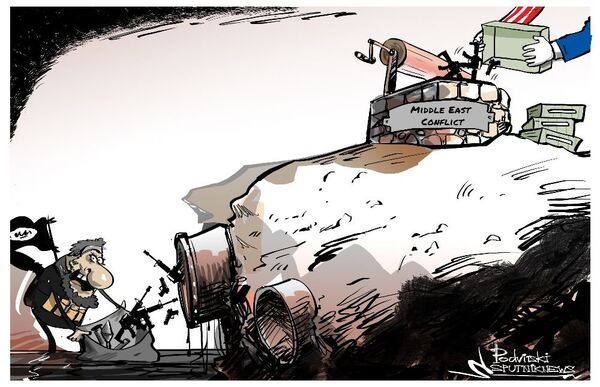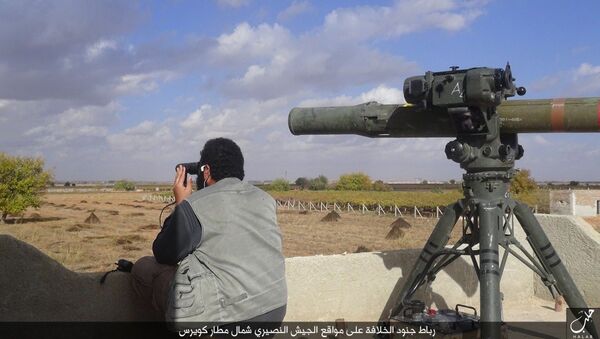Sputnik: Could you please share your view with our listeners on how NATO weapons and communications equipment could have turned up in a Daesh warehouse?
Ammar Waqqaf: If we ignore direct arming theory for a while, I think it's not really realistic to say that the United States is selling weapons directly to Daesh; the United States and its allies have indeed, in my opinion, helped Daesh a lot mainly, obviously, by undermining the Syrian state, but the issue of weaponry ending up in Daesh hands may have come and most probably have come through indirect means. The United States would, for example, identify a certain group of Syrians, or rebels or regional groups as non-level or non-affiliated with al-Qaeda; they would give them weapons, training and so on and those people or those groups would be swallowed later on by the likes of Daesh and Jabhat al-Nusra [al-Nusra Front] and we've seen this time and again. Or it could be a simple purchase, you know, operation or transaction where Daesh could grab a few weapons from here and there. In a sense, the United States would be indirectly providing them with weapons or NATO would be indirectly providing them with weapons by not making sure that the weaponry they give to other people would not end up in the wrong hands.

Sputnik: Over what period could Daesh have had obtained all of these NATO weapons and equipment and what role could it have played in Daesh's military victories?
Ammar Waqqaf: Daesh has been operating in Syria for the past five years at least: Since 2012 we've heard [about] their operations not only in the eastern part of Syria, but also in the northwestern part and in those periods they were quite mingling with other groups who were receiving direct, you know, assistance from the United States. We also remember that there is another group in the southern part of Syria that about a year or so ago decided to attack or to launch an attack against Daesh and they were defeated by Daesh and obviously left over some weapons. So, I would say, that throughout the past five years Daesh may have accumulated a large stockpile of NATO weaponry either by swallowing other groups or, again, by purchasing some in pure transactions, perhaps, even across the border with Turkey, who is a NATO member, and also by capturing through direct combat with other groups some of the leftovers from the battlefield.
Sputnik: This is quite an embarrassing situation for both the US and Europe, I guess, in terms of finding all these NATO weapons in a Daesh storehouse. What will the ramifications be for these countries after this surprising discovery?
Ammar Waqqaf: It is embarrassing in the sense that the United States stated and their allies, the NATO allies, stated that whatever weapons they were trying to supply to groups operating in Syria, they were under severe control, they were trying, you know, to make sure they don't fall into the wrong hands, we understand also that other larger operations, or larger-scale arming operations took place by getting, for example, money from the Gulf States — Saudi Arabia and Qatar — to pay for ex-Soviet weaponry from the Balkans, for example, Serbia and so on in order not to get the NATO weaponry involved directly, but then, a certain period of time came when NATO started to provide even more lethal weapons like TOW missiles — anti-tank missiles, very sophisticated — which turned the tide at the battlefield. These were initially, supposedly, provided to moderate rebels or moderate groups, but these were swallowed again by Jabhat al-Nusra, by al-Qaeda, Daesh and so on. It is very embarrassing because it shows that even though they with the declared objective of not getting or allowing the weaponry to fall into the wrong hands they have indeed fallen into the wrong hands. And so the whole chain, the whole supplying chain and, you know, checks and balances that were supposed to be there either were too lenient or weren't there at all.


